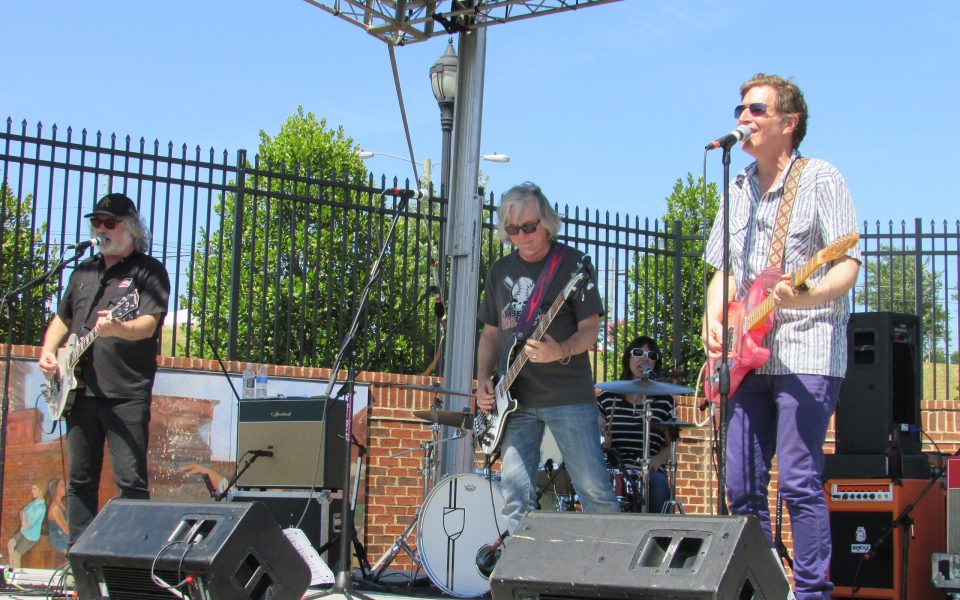by Jordan Green
Steve Wynn cast a sidelong glance across the stage at his his bandmate Scott McCaughey behind centerfield at BB&T Park in Winston-Salem.
“Is your hat indicative of anything?” Wynn asked.
“It’s indicative of the Oakland A’s,” McCaughey replied. “They’re pretty good from time to time. Not this year. But I still have hope.”
With that, the Baseball Project — a super group comprised of members of American underground rock bands that matriculated around 1985 — launched into a rousing rendition of “They Are the Oakland A’s,” a song on the band’s most recent album, III. Scrappy and loose with a happy outlook in spite of the odds, the song framed a neat parallel narrative of the archetypal rock-and-roll band seeking fame and glory on the road with little to no prospects.
“Young and hungry, small payroll,” McCaughey sang. “But Billy Beane loves rock and roll/ Hey hey/ They’re the Oakland A’s.”
About halfway through the song there was a squall of feedback and the sound cut out. As it telegraphed back in intermittently, Wynn loosed a ragged but inspired guitar solo.
“Sorry about the feedback,” McCaughey quipped. “I think we can blame it on this Angels fan here.”
He gestured towards a teenager standing in front of the stage with his dad.
Capturing the camaraderie of a cohort of American underground bands that rose to prominence in the mid-1980s, the Baseball Project’s charm is its inflection from edgy, experimental rock into a lighthearted homage to baseball heroes and villains, diehard fans and box-score obsessives.
They’re all celebrated on a level playing field by a group of veteran players who have met with mixed success. Among the three bands that supplied this all-star lineup, only one — REM — made it into the major leagues, with “The One I Love” cracking the Billboard Top 10 in 1987 and laying the groundwork for megastardom in the 1990s. But the Young Fresh Fellows, led by McCaughey, paved a trail in the Pacific Northwest for subsequent innovators like Mudhoney and Nirvana, and Wynn’s band, the Dream Syndicate, updated a Velvet Underground-style drone rock in Los Angeles that was beyond its time.
McCaughey recorded and performed with REM from the early 1990s onwards, becoming a kind of unofficial fifth member of the band. Linda Pitmon came to the Baseball Project as the band’s drummer after a history of musical collaboration with Wynn as he continued to pursue music beyond the heyday of the Dream Syndicate.
During the Baseball Project’s pre-game Father’s Day concert at BB&T Ballpark before a matchup between the Winston-Salem Dash and the Salem Red Sox on Sunday, McCaughey and Wynn handled most of the lead vocals, with Mills happily anchoring the band on bass while contributing harmony vocals. Taking the lead on a rare song like “To the Veteran’s Committee,” a rousing rocker containing a straightforward appeal to induct Dale Murphy into the Baseball Hall of Fame, Mills showed off his goods, albeit with the relaxed confidence of someone who has nothing to prove. It served as a reminder that he was a solid pinch hitter behind lead singer Michael Stipe, while it was refreshing to see him playing as an equal in a group whose other members may not have enjoyed REM’s success, but matched their vision and ambition.
Promoted as part of the Southeastern Center for Contemporary Art’s “Crossroads” concert series,” the low turnout — about 50 or so gathered on the lawn behind the fairway to listen to the one-hour set — and heat didn’t seem to wilt the spirits of either the band or the audience. In rock and roll, as in baseball, sometimes parochial loyalties and obscure obsessions trump conventional triumphs. So it was that Mitch Easter, who operates Fidelitorium Recordings in Kernersville, received a mention from the stage for mixing III, but the more illustrious fact of his role in producing REM’s first full-length album at his Drive-In Studios in Winston-Salem more than three decades ago went unremarked. Mills went better than to trumpet that his famous band recorded here, displaying a graceful touring musician’s sensitivity to the particularities of place.
“This is for all of you who still have your baseball cards,” Wynn said before introducing “The Baseball Card Song.” “I got mine. That and some LPs from 1974. Not much more.”
Mills chimed in: “I got a Sneakers record!”
The reference to the obscure and seminal mid-1970s Chapel Hill band that spawned both Let’s Active and the dBs appeared to go over everyone’s head, although Easter and Parke Puterbaugh, a music writer who covered REM for Rolling Stone in the early 1980s, were in the audience to appreciate it.
It was a weird and wholesome scene all at the same time, marked by the odd collision of a parade of Little League players and parents gawking as they passed knots of appreciative hipsters cheering the band.
One thing brought everybody — band members, baseball fans and seniors alike — together on a mid-afternoon baseball game in Winston-Salem: sunglasses.
It was hard to tell whether they were a cool-guy affectation or a geezer insurance plan. Maybe both.
Join the First Amendment Society, a membership that goes directly to funding TCB‘s newsroom.
We believe that reporting can save the world.
The TCB First Amendment Society recognizes the vital role of a free, unfettered press with a bundling of local experiences designed to build community, and unique engagements with our newsroom that will help you understand, and shape, local journalism’s critical role in uplifting the people in our cities.
All revenue goes directly into the newsroom as reporters’ salaries and freelance commissions.


Leave a Reply